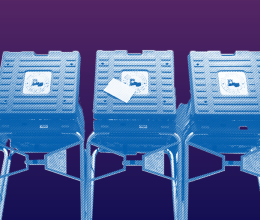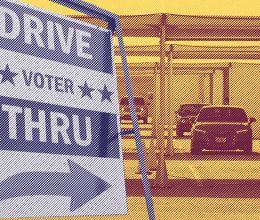
SAN ANTONIO - The federal trial against Texas’ anti-voter law Senate Bill 1 concluded Friday after nearly six weeks of testimony from dozens of witnesses. Closing arguments are set for January 12. The judge will issue his final ruling at a future date.
At the consolidated trial, representatives from plaintiff organizations OCA-Greater Houston, the League of Women Voters of Texas, and REVUP-Texas testified that certain provisions of S.B. 1 make it substantially more difficult for many of their members to vote, especially for people who are more comfortable with languages other than English, for people with disabilities, and for those who have no other option but to vote by mail.
The plaintiffs were represented in court by the American Civil Liberties Union of Texas, the ACLU, the Texas Civil Rights Project, the Asian American Legal Defense and Education Fund, Disability Rights Texas, and the law firm Jenner & Block LLP.
Being challenged are the specific provisions that require mail voters to provide an ID number that matches their voter file, and that criminalize mail-voting assistance and certain types of political speech near voters with their mail-in-ballots. These provisions violate the Voting Rights Act, the Americans with Disabilities Act, the Rehabilitation Act, and the U.S. Constitution.
Texas politicians passed the sweeping anti-voter bill during a special legislative session in the fall of 2021 following months of protests and a quorum break that brought the legislature to a standstill.
This trial follows a prior win in this case where the district court ruled that S.B. 1’s new ID number matching requirements for mail-in voting are unlawful. During the 2022 elections, this requirement resulted in the disenfranchisement of tens of thousands of Texans who voted by mail. This trial also follows a separate and successful challenge to S.B. 1’s limitations on the type of assistance that may be rendered to Limited English speaking and disabled voters.
The following are statements from the plaintiffs:
“The League of Women Voters of Texas was founded over 100 years ago in San Antonio, which is where this federal trial to defend our voting rights has been taking place over the past several weeks," said Grace Chimene (she/her), former president of the League of Women Voters of Texas. "I testified in court about how S.B. 1 has made it harder for the League to empower Texans to vote by restricting our ability to provide assistance to voters and host voter education events. After this trial, we are now one step closer to restoring the League's ability to fully empower voters for the next 100 years of the League's existence.”
“It is critical that the League of Women Voters of Texas share how S.B. 1 has harmed our ability to serve voters and protect democracy,” said Celina Stewart (she/her), chief counsel and senior director of advocacy and litigation of the League of Women Voters of the US. “For years, Texans have struggled to secure their voting rights and we hope that the court will issue a ruling that protects the ability of the League to deliver on our mission to defend democracy and empower voters.”
“OCA-Greater Houston has been providing Chinese language assistance and getting out the Asian American and Pacific Islander vote in the Greater Houston area for over two decades,” said Deborah Chen (she/her), Civic Engagement Programs Director for OCA-Greater Houston. “But as I testified in court, S.B. 1’s new criminal prohibitions have made it impossible for us to continue these activities, because we cannot take the risk that any one of our members, many of whom are young students, will be criminally charged with violating S.B. 1. We are optimistic that the Court will recognize the harm that S.B. 1 has caused and will rule in our favor.”
“S.B. 1 needlessly and unlawfully created barriers for persons with disabilities to exercise their fundamental right to vote,” said Bob Kafka (he/him), state coordinator for REV UP-Texas. “REV UP and its members are proud of their participation in this lawsuit challenging the legality of S.B. 1, and it will continue its efforts to increase the disability vote and to fight against disability discrimination. REV UP eagerly awaits another favorable ruling from the Court. NOTHING ABOUT US WITHOUT US.”
The following are statements from the litigation team:
“The court already ruled in August that S.B. 1’s new ID requirements are unlawful, and we are optimistic that the law’s other harmful changes will be struck down as well,” said Ashley Harris (she/her), staff attorney with the ACLU of Texas. “Since its passage, this voter suppression law’s criminal penalties have limited access to assistance guaranteed under the Voting Rights Act for voters with disabilities and voters who speak languages other than English, while also chilling political participation by community organizations. Our clients and their members, who work tirelessly to promote voting rights in Texas, testified powerfully at trial to the detrimental effects of the law.”
“S.B. 1’s restrictions are a shameful attempt to make it more difficult to cast a ballot in Texas,” said Dayton Campbell-Harris (he/him), staff attorney with the ACLU Voting Rights Project. “Over the past five weeks, our clients have testified to the severe effect S.B. 1 has on voters of color, voters with disabilities, and older voters. Their testimony has exposed S.B. 1’s effects on voting in Texas, and shown why the challenged S.B. 1 provisions must be struck down to protect democracy.”
“S.B. 1 has added barriers, frustration, and confusion to the Texas election process, not only for our clients and their members, but for voters across the state,” said Zachary Dolling (he/him), senior staff attorney with the Voting Rights Program at the Texas Civil Rights Project. “Rather than improving so-called ‘election integrity,’ S.B. 1 instead threatens voting assistors with harsh criminal penalties, makes it harder for limited-English proficient voters and voters with disabilities to obtain voting assistance, chills participation in the political process, and has resulted in the rejection of tens of thousands of mail ballots on the basis of irrelevant paperwork errors. We are confident that our clients’ testimony has shed light on these harmful truths and that the Court will strike down the challenged provisions of S.B. 1 so that they no longer stand in the way of Texans’ fundamental right to vote.”
“Asian Americans are the fastest growing population in Texas, with an overwhelming majority speaking a language other than English at home, and enormous language barriers to voting and political participation,” said Susana Lorenzo-Giguere (she/her), associate director of AALDEF’s Democracy Program. “The moving testimony of our witnesses in this S.B. 1 trial, including Deborah Chen, Civic Engagement Programs Director for OCA-Greater Houston, shows the devastating impact of S.B. 1 on fair voter access for all Texas voters — especially limited English-proficient Asian Americans and others, and those with disabilities, and for the community organizations that assist them. S.B. 1’s excessive ‘anti-fraud’ measures are like using a flamethrower to kill a fly. Criminalizing the crucial assistance to limited English-proficient voters and voters with disabilities is utterly anti-democratic and must be struck down. The court has already said that S.B. 1’s oath of assistance and ID-matching provisions violate federal law. We are confident that we will prevail in this trial challenging the rest of S.B. 1’s discriminatory and anti-voter provisions.”
“We have already seen portions of S.B. 1 rolled back as unlawful restrictions on voting,” said Alex Trepp (he/him), partner at Jenner & Block. “Having heard compelling testimony on our remaining challenges, including obstacles presented by the provisions addressed at trial, we hope these harmful limitations on the right to vote will be struck down.”
“This past month, the evidence presented at trial has overwhelmingly shown that S.B. 1 has harmed voters with disabilities by creating new hurdles to voting, in violation of the Americans with Disabilities Act and the Rehabilitation Act,” said Chris McGreal (he/him), attorney with Disability Rights Texas. “The evidence that showed violations of the ADA and Rehabilitation Act could not have been possible without the courageous individuals with disabilities and the individuals who assist them in voting testifying about how they have been injured by S.B. 1 and will continue to be prevented effective, equal, and inclusive access to voting should S.B. 1 hurdles remain in place.”
